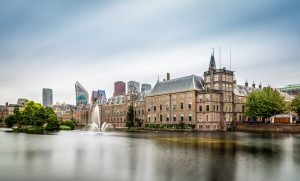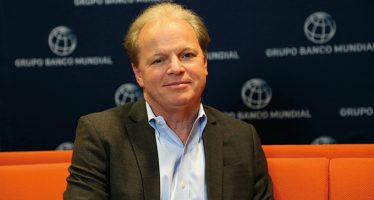EU Prime Ministers Beat a Path to The Hague

The Hague
This month, The Hague has become the destiny of choice for EU prime ministers and presidents embarking on a pilgrimage to placate, woo, mollify or pay homage to Saint Mark – the self-anointed patron of the frugal. In his impressively undersized office, located in a tower of likewise underwhelming size, part of the Medieval Binnenhof complex that houses the Dutch government, Prime Minister Mark Rutte received in quick succession his Spanish, Italian, and Portuguese counterparts.
EU Council President Charles Michel also found his way to The Hague as did French President Emmanuel Macron who, during an earlier visit to the Binnenhof, caused some consternation after he mistook Rutte’s office for an anteroom to a chamber of more appropriate grandeur and expressed disbelief that a prime minister of any country, let alone one home to the fifth-largest economy of the union, could dwell in such a cramped space.
However, the modest size and sparse decoration of Rutte’s office drives home a point that few visitors can miss: the Dutch, even those of a more worldly persuasion, remain committed to their Calvinist view of the world, particularly when it comes temperance, debt, and penance. That philosophy of prudence and frugality clashes head-on with the present need for fiscal largesse, and solidarity, to prevent the current corona recession from turning into a depression – and a hatchet that may strike at the root of European integration and split the union into quarrelling regional blocs.
After politely listening to the appeals made by his visitors, Rutte gave no indication that he may cede ground. His position remains unaltered even after Michel came bearing gifts worth billions of euros. Michel assured the Dutch that they may keep their prized €1.5 billion annual rebate on EU remittances and promised to set aside €5 billion for countries such as The Netherlands that are hard-hit by the UK’s exit from the union. He also promised to shave another €24 billion or so from the next EU budget.
Rutte appreciated the gesture and called it an ‘entry ticket’ to start negotiations. However, he still insists that the proposed €750 billion post-corona recovery fund be entirely comprised of credit facilities to be distributed on the basis of merit – not need. Only member states that implement meaningful structural reforms may qualify for cheap and plentiful credit. The Dutch also demand that an entity be created to monitor compliance and that it be invested with the power to halt payouts should members deem the pace of reform insufficient.
These demands are unacceptable to the governments of Spain, Italy, and Portugal which flatly refuse to submit their countries to a novel ‘troika’ not dissimilar from the one that dictated terms to Greece during the country’s 2010 debt crisis. In an unfortunate coincidence, that troika of stern paymasters was led by former Dutch Finance Minister Jeroen Dijsselbloem whose claim to infamy includes the tactless remark that Mediterranean people should lay off the ‘women and wine’ and work a bit harder instead.
Though determined to maximise the return on his brinkmanship, and basking in the limelight, Rutte realises that he is ultimately unable to stop the French-German juggernaut from imposing its will on the European Union. The most he can hope for is to nudge the Paris-Berlin axis a few points off course. For now, though, Rutte remains the man of the moment, holding the key to the outcome of next Friday’s council meeting in Brussels when both the EU’s own budget and the emergency recovery fund need to be hammered out.
Remarkably, Rutte has not blinked so far and shrugged off German criticism of his ‘childish behaviour’, assuming with evident gusto the role of naysayer vacated by the UK upon leaving the union. Last week, the Dutch flexed their newfound diplomatic muscle by successfully mobilising smaller member states to block the election of Spanish Economy Minister Nadia Calviño to the presidency of the Eurogroup, the informal yet powerful body that brings together the euro area’s finance ministers.
Though Calviño’s candidacy was openly and wholeheartedly supported by Germany, France, and Italy, she lost out to Irish Finance Minister Paschal Donohoe who received backing from the smaller member states, loosely united in the Hanseatic League 2.0, yet another Dutch initiative to check the power of Berlin and Paris. The episode was interpreted as a shot across the bow, reminding the larger EU member states that they cannot impose their will on the smaller ones.
No longer content to follow Germany’s lead, certainly not after Chancellor Angela Merkel abandoned her prior commitment to austerity and frugality, the Dutch are expected to hold out until a bit past the proverbial eleventh hour. Experience shows that agreement in the European Council is usually reached in the wee hours of the morning when the recalcitrant succumb after having their grievances addressed in a roundabout – double Dutch – way that saves face and enables all participants to claim victory.
You may have an interest in also reading…
World Bank on COVID-19: The Road Back Must Be Green, Resilient, and Inclusive
By Axel van Trotsenburg World Bank Managing Director of Operations COVID-19 has imposed a deeper, more widespread shock than the
Uzbekistan ‘s Enter Engineering announces Covid years project updates and operations guidance
According to Ulugbek Usmanov, General Director at Enter Engineering: “Enter Engineering is involved in a variety of projects central to
Free Trade in Retreat in Europe due to Environmental and Labour Standards
The EU free trade baton, carried by the UK until Brexit, has been relayed to the Stockholm Six of like-minded















































































